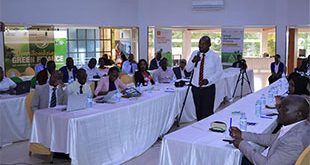
Kampala, Uganda | THE INDEPENDENT | Experts assessing the performance of Uganda towards attaining Sustainable Development Goals (SDGs) have revealed that the country has no data on goal 14 which calls for conserving and sustainable use of oceans, seas, and marine resources.
Speaking to URN in an interview on the sidelines of the Voluntary National Sustainable Development Goals (SDGs) review meeting, Onesimus Kansiime a Senior Knowledge Management officer at the Office of the Prime Minister said that while Uganda has made strides to achieve most of the 17 SDGs, they cannot report on the status of SDG 14 due to lack of data.
Under Goal 14, the United Nations had among others set that countries prevent and significantly reduce marine pollution of all kinds by 2025, provide access for small-scale artisanal fishers to marine resources and markets, and end subsidies that lead to overfishing.
In addition, they had set that they regulate harvesting and end overfishing, illegal, unreported, and unregulated fishing and destructive fishing practices by adopting science-based management plans, to restore fish stocks to levels that can produce maximum sustainable yield. However, just five years to 2030, Uganda is uncertain on where we stand as far as attaining these targets is concerned.
Kansiime says efforts are underway to make this data available so that they can report on it. He also gives an update on the performance of other targets saying that the country is scoring highly on SDG 12 for responsible consumption and production partly attributing this to the move by the government to regulate importation of products that have high nitrogen concentration.
Other SDGs listed where the country has performed well include SDG 13 for climate action, SDG 8 for decent work and economic growth, 9 for industry innovation, 15 for life on land, and SDG 3 for good health and well-being which has several indicators including reduction in maternal and child mortality, achieving universal health coverage and reducing deaths from hazardous chemicals and pollution.
Commenting about this, experts expressed mixed feeling some saying that although there’s currently some progress, attaining these goals in the remaining few years might be difficult.
Prof Joy Lawn, a child health expert at the London School of Hygiene and Tropical Medicine says achieving them would require doubling investment by the country. Citing neonatal deaths, Lawn says the country has achieved too little in a very long period.
In twenty years, the country has only managed to reduce neonatal death from 25 per 1000 live births to 22 per 1000 live births and yet the SDG target for neonatal death is 12 per 1000 live births to be achieved in just the remaining five years.
The views from ongoing voluntary review meetings will be integrated into the national report which will be presented at the UN High-Level Political Forum on Sustainable Development in New York in July.
Meanwhile, studies show many countries in the West, especially in the European Union have already achieved many of the SDG targets set in 2015.
****
URN
 The Independent Uganda: You get the Truth we Pay the Price
The Independent Uganda: You get the Truth we Pay the Price



